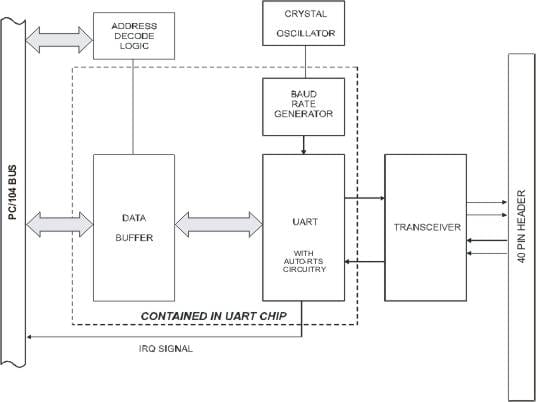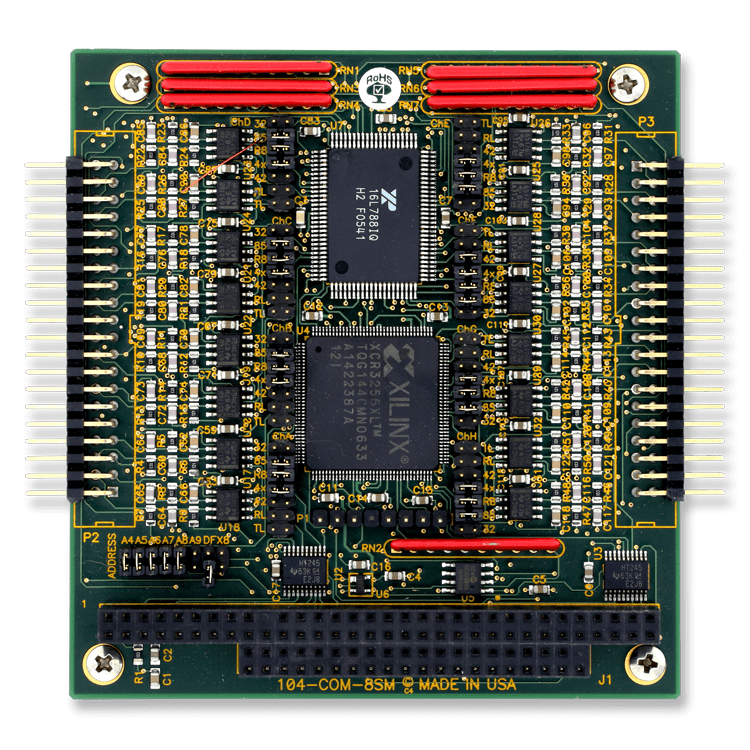104-COM-8SM Multi-protocol Serial Boards
Eight, Four, and Two Port Serial PC/104 Boards supporting RS-232, RS-422, or RS-485
Features
- 8, 4, or 2 independent asynchronous serial COM ports
- Field selectable RS-232, RS-422 and RS-485, independent for each port
- Auto-RTS feature makes half-duplex RS-485 communications effortless
- Speeds up to 921.6K with 64-byte FIFO (RS-232 is 230K max)
- Fixed bias and jumper selectable termination provided on each transmit and receive channel simplifies cabling
- Programmable individual non-volatile base addresses and IRQs simplifies installation
- Low power required: +5VDC at 80 mA typical
- Operates as a standard COM port in all operating systems
- Extended operating temperature (-40°C to +85°C) on the 4 and 8 port versions
Factory Options
- RoHS compliant version
- Extended operating temperature (-40°C to +85°C) on 2-port version
$209.00 – $499.00
In StockDescription
This is an eight-, four-, or two-port, asynchronous, serial communication board designed for use on the PC/104 bus. It supports RS-232, RS-422 or RS-485 communications. The board may be installed in any standard PC/104 stack. Connections are made via two 40 pin IDC type right angle connectors. Common applications include POS, gaming systems, machine monitoring, military and high-density networking.Type 16780 UARTS are used as the asynchronous communication elements. These include 64-byte transmit/receive FIFO buffers to protect against lost data in multitasking systems while maintaining 100% compatibility with the original IBM serial port (software compatible with Windows COM port drivers).
A crystal oscillator located on the board permits precise baud rate capability up to 115,200. Higher speeds, up to 921.6K, are achieved by installing a jumper on the board.
The addresses of the individual channels and IRQ are stored in non volatile memory on the board and loaded into programmed logic when the board is initially powered.
As PC/104 is becoming more of a legacy bus for our products, manufacturing has eliminated the standard temperature version of the 104-COM-4SM and 104-COM-8SM boards, so they are now only available in extended temperature versions operating from -40 to +85°C (104-COM-4SM-T and 104-COM-8SM-T, respectively).
AUTO TRANSCEIVER CONTROL
In RS-485 multidrop communications individual drivers must be enabled when needed and then disabled after use to permit all ports on the network to share a two-wire or four-wire cable. The 104-COM-8SM and 104-COM4SM use an automatic (AUTO) control software selectable channel by channel. The driver is enabled (and the receiver disabled) when data is ready to be transmitted. When transmission is complete, the driver remains enabled for the transmission time of one additional character and then is disabled. This is ideal for use in Windows based applications as the standard Windows COM port driver is used to ensure compatibility.
UTILITY SOFTWARE
Tools provided include samples to demonstrate COM port initialization in multiple languages. Driver software is provided by Windows and all other major operating systems, including Linux (16550 compatible.) A graphical Setup program is provided to assist with jumper selections for protocol and address configuration.
Downloads
Data Sheets
Manuals
Software
- 104-COM-8SM Software Package ( -- Last Uploaded 2025-05-07)
Drivers and Downloads
Full list of available Downloads: Software Packages, Drivers, Manuals, and other documents
Information about our Free Software packages:
ACCES is proud to provide a full suite of software support with every Data Acquisition product. We are committed to supporting the most popular operating systems and platforms for our customers. Currently we are actively supporting 7 -> 11, both 32 & 64 bit, including “Server 2008,” “Embedded,” and “Compact” flavors for all plug-and-play products including PCI, PCI Express, USB, and more. Many products continue to ship with support for additional operating systems such as DOS, Windows 95, 98, Me, NT4, 2000, and XP.
Samples
Among the software we deliver with our products are sample programs in a wide variety of programming languages. These samples are used to demonstrate the software interfaces to our products — and many can be used as-is in your production environments, or to test functionality of the devices out-of-the-box. We’re currently actively supporting sample programs in Microsoft Visual C#, and Delphi, with many devices including samples in Visual Basic (5 and .NET), Visual C/C++, and Borland C/C++ 3.1 for DOS. Additionally we provide National Instruments LabVIEW compatible DLLs and many demonstration VIs for our devices.
Drivers
Drivers for various operating systems are also provided, including active support for Windows 7 -> 11 — all in both 32-bit and 64-bit flavors, and including consumer, server, and embedded varieties — as well as the 2.6 and newer Linux kernels and recent OSX / macOS versions. Many products continue to ship with driver support for Windows 95, 98, Me, NT4, Windows 2000, XP, and more, but support for these operating systems is considered deprecated.
Setup Programs and Utilities
Our Data Acquisition devices also include a graphical setup utility that walks you through the process of configuring any option jumpers or switches on the device, as well as explaining a little about the various connectors present.
Many devices also include utility programs – little tools to make your use of the device easier, such as EWriter, a program that allows you to read and write data in the user-accessible EEPROM locations on all our USB data acquisition products; or WinRISC, a “Really Incredibly Simple Communications” terminal program that lets you get started instantly with serial devices.
“Register Level” Documentation
Besides all this software in all these languages and operating systems ACCES has a policy of open and transparent development: none of our lowest-level “register” interfaces are hidden from you — we document every register in every bus card, every command in every serial board, and every usb control transfer in every USB Data Acquisition board. These lowest-level interfaces allow you to develop for our products in ANY operating system or language, regardless of our actively supporting it or having a driver for it. We have customers actively developing in ADA, Android, Python, Java, MATLAB, Solaris, and more, just by referring to our complete low-level interface documentation! And we provide the full source code to all of our drivers, regardless of operating system, to give you an even bigger head start in your own development tasks.
No Fees or Royalties
All of this software is provided at no additional charge, and is licensed under any of a variety of flexible — and royalty free — options. Check out our software license explanation if you’d like more information.
Custom Software
ACCES also offers Custom Software Services for our products. Our prices are unbelievably low, often as inexpensive as free! If you need something tweaked to support your needs, or an entire enterprise application developed from scratch, it is definitely worth your time to inquire with us, first.
Further information about available ACCES Software:
Redistributing Windows Drivers
A list of ACCES drivers and the files that compose them under different versions of Windows, so you can easily redistribute ACCES cards and drivers.

Communications Interface
- I/O Connections: Via two 40 pin IDC type right angle connectors. There are eight pins per port plus common grounds.
- Character Length: 5,6,7, or 8 bits
- Parity: Even, odd, or none
- Stop Interval: 1, 1.5, or 2 bits
- Serial Data Rates: Up to 115.2K baud, asynchronous. A faster range of rates, up to 921.6K, is achieved by jumper selection (RS-232 is 230K max).
- Multidrop: Compatible with RS-485 specifications. Up to 32 drivers and receivers allowed on line. Driver/Receivers used are type 75ALS180. Compatible with RS-422 specifications. Up to ten receivers allowed on line.
- Address: ISA BUS address is set by jumpers on the board. A “Default” jumper determines whether the channel addresses are sequential or loaded from non-volatile memory on the board.
- Interrupts: Individual IRQs for each channel are stored onboard in non-volatile memory.
- Receiver Input Sensitivity: ±200 mV differential input
- Common Mode Voltage Range: +12V to -7V
- Transmitter Output Drive Capability: 60 mA with thermal shutdown. Jumper selectable terminations for input and output, by channel, are provided. Bias is also provided.
Environmental
- Operating Temperature Range:
- 0 to 70°C on 2 and 4 port versions
- -40 to +85°C on the 8 port version (optional on 2 and 4 port versions)
- Storage Temperature Range: -50 to +120°C
- Humidity: 5% to 95% RH, non-condensing
- Power Required: +5 VDC at 80 mA typical, all outputs open
CE testing & approval must be done at the system level, in the designed enclosure, and is not done on individual boards.

| Model | Description | Price (USD) | |
|---|---|---|---|
| 104-COM-8SM-T | PC/104 Eight Port RS232/RS422/RS485 with Extended Temperature | $499.00 | |
| 104-COM-4SM-T | PC/104, Four Port RS232/RS422/RS485 with Extended Temperature | $399.00 | |
| 104-COM-2SM | PC/104, Two Port RS232/RS422/RS485 | $209.00 |
| Accessories | |
|---|---|
| C104-40F-D9M | Cable, Ribbon, Female to four DB9M, 12″, $25 |
| C104-40F-D9M-6 | Cable, Ribbon, Female to four DB9M, 6″, $25 |
| C104-40F-D9M | Cable, Ribbon, Female to Female header, 40 pin, 12″, $12 |
| C104-40F-D9M-6 | Cable, Ribbon, Female to Female header, 40 pin, 18″, $14 |
| C104-40F-30 | Cable, Ribbon, Female to Female header, 40 pin, 30″, $15 |
| C104-40F/D37F | Cable, Ribbon, Female to DB37F, 12″, $19 |
| STB-40 | DIN-rail mountable screw terminal board with latches for 40-pin header $44 |
| Options (call for pricing) | |
| -T | Extended operating temperature (-40°C to +85°C) on 2-port version |
| -RoHS | RoHS compliant version |

